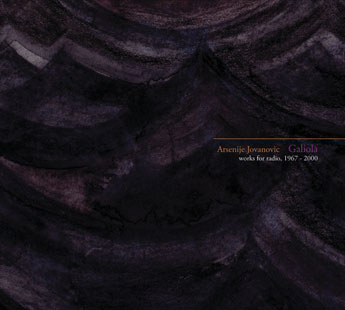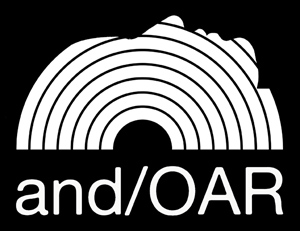Track List:
01. Prayer For One Galiola (1967)
02. Tombstones Along The Roadside (1967)
03. Prophecy Of The Village Kremna * (1990)
04. Les Vents Du Camargue (2000)
* Portions of this piece were used in "The Thin Red Line", a film directed by
Terrence Malick.
FO A RM Projects, in collaboration with and/OAR and Alluvial Recordings, is
pleased to present this 80 minute collection of sound works, newly
remastered and accompanied by extensive notes by the composer.
Over the last 40 years, Serbian radio-art composer and film director Arsenije
Jovanoviæ has developed a deeply personal style of sound art for radio
broadcast. His compositions are imbued with natural environments and
human-centered activities. They feel rooted in place - whether real,
imaginary, remembered or dreamed. Weaving voices, instruments, field
recordings and manipulated sound, Jovanoviæ creates vivid narratives
without a story. He takes full advantage of sound’s capability for seamless
morphing and far-flung association.
Read more at the a/O blog.
The CD comes packaged in a digipak with 12 page booklet.
Bio:
- Theatre, radio and television director, born in Belgrade, Serbia 1932.
- Writer and audio-art author, university professor - he taught acting at the
Faculty of Dramatic Arts in Belgrade until the start of the war in ex-Yugoslavia.
- Fulbright scholar and visiting professor at State University of New York at
Albany.
- For eleven years, he was theatre director in The National Theatre in
Belgrade, later artistic director of The Bitef Theatre (Theatre in the Church),
directing plays for theatres both in former-Yugoslavia and abroad (Sheffield
in England, Sofia in Bulgaria, Albany in USA).
- Author of different sound installations - was in Berlin as a part of SFB partici-
pation at Sonambiente event.
- Initiator of a sound workshop at Kunstradio (ÖRF, Wien).
- Initiator of a sound workshop at Media Arts Center at the University of
Sydney 1999, participating sound workshops in Finland (Oulu and Helsinki),
and Denmark (Faeroe Islands).
- Founder of the Adriatic Sound Factory, a moving sound laboratory settled for
the time being in Rovinj in Istria, Croatia.
Awards:
Apart from awards in his home country (formerly Yugoslavia, now Serbia),
Arsenije received the following:
- Prix Italia in the category of stereo work for "Tombstones Along The
Roadside" (Venice, 1971)
- Prix Italia For "Resava Cave" (Venice, 1977)
- Premio Ondas for "Resava cave" (Barcelona, Spain, 1978)
- Premio Ondas for "Along The Long Long Street" together with Ms. Neda
Depolo (Barcelona, SPAIN)
- WDR Acustica International for "Faunophonia Balcanica" (Cologne, 1990.)
- Finalist award for "Homo Politikus Vulgaris" with P. Siren and A.
Walligorska at New York Radio Art Festival (New York, 1992.)
- First prize for "Concerto Grosso Balcanico", International Radio Festival in
Rust (Austria)
- Grand prix Radio France International with Ilinka Colic for "La parata"
(Palmares, France, 1997)
Reviews
_________________________________________________________________________________
The Wire (January 2009)
Pulling together four pieces from 1967-2000 by Serbian radio composer
Arsenije Jovanovic, Galiola is a brilliant but frustrating collection. The two
earliest works here, "Prayer For One Galiola" and "Tombstones Along The
Roadside", both produced for state broadcaster Radio Belgrade in 1967, are
richly dense, emotive works, collaging imposing liturgical incantations,
orchestral fragments and clattering everyday sound effects.
Unfortunately, the texts, which are clearly integral to these radio pieces are
completely untranslated. This would be an oversight with an opera, but here,
where much is simply spoken word, it is maddening. The liner notes are
reasonably helpful on subject matter, explaining the works in Jovanovic's
own words - "Prayer For One Galiola" is apparently inspired by a fantasy of
an island in the Adriatic, while "Tombstones" is a "national Danse Macabre"
in memory of Balkan wars - but the information just makes the linguistic
impenetrability all the more frustrating.
Mercifully, this isn't a problem with the second half of the CD. "Prophecy Of
The Village Kremna", broadcast by Radio Belgrade in 1990, abandons text
altogether in favour of a swelling, 26 minute miasma of drones and
atmospheres. It's a tremendous, elemental piece, and the CD is worthwhile
for it alone; it was later used by Terrance Malick for The Thin Red Line,
although it stands perfectly well in isolation. The final "Les Vents Du
Camargue" (2000) sounds like variations on a similar theme, without quite
the same unnerving power but with its own more allusive qualities. In all,
Galiola is a fascinating record, but an on-hand translator would be useful.
(Owen Hatherley)
Brain Dead Eternity (November 2008)
Criminally under-recorded, the music of composer and director Arsenije
Jovanoviæ possesses the kind of remarkable qualities that, love it or hate it,
are going to finger the nerves of those who listen conscientiously. The
nearest thing to a blurred concept of “notoriety” for this artist derives from the
involvement in the soundtrack to Terrence Malick’s movie “The Thin Red
Line”, which in fact features Jovanoviæ’s “Prophecy of the Village Kremna”.
That’s the longest and most suggestive vision in this four-episode
compilation, based as it is on an ancient Serbian prediction, a numinous
foretelling about “catastrophic events and apocalyptic occurrences which will
fall upon the homeland and its people”. A sequence of haunting female
voices, lingering nocturnal appearances, distant moans, sighs and
mumbles, humming low frequencies chipping away at the tranquillity of a
candid latecomer, likely to have impressionable audiences sleeping rather
uncomfortably should this track be played at late evening.
Strikingly emotional as well is 1967’s “Tombstones Along The Roadside”,
described as a “national Danse Macabre” by the originator; initially conceived
as a theatrical stage act, the composition honours the innocent victims of the
Balkan wars from the end of 19th century to WWII, portions of the texts taken
from the gravestones of deceased soldiers and subsequently transformed in
monologues and hypothetical dialogues between the sufferers and their
tormentors. The remaining tracks are, to some extent, not as much of evil-
boding - but extraordinary nonetheless. “Prayer For One Galiola” was born
from an unpleasant incident as, many years back, Jovanoviæ found himself
lost at sea in the dead of night, his boat’s engine not working (he landed on
a small island named Galiola after hours of wandering in the waters), and
also from an assortment of hallucinations following a car accident that,
somehow, were all associated with this name. “Les Vents du Camargue” is
the most concrete-sounding affair, the main source being the Mistral that
made impossible an external recording at first and took the leading role
afterwards, either through its forceful blowing or via the psychological
mechanisms that were set in motion by the wind’s influence, the whole
taped at the Cathedral of St. Trophime in Arles. Still, this depiction doesn’t
even acquaint with a tiny bit of what this great piece sounds like.
Jovanoviæ’s particulars are uniquely vivid, having the large part of this music
been written for radio broadcasts (and, in general, rarely performed). The
dramatic aspects are definitely predominant, often disturbing; there’s a sort
of bloodcurdling magnificence emerging in several fractions of these sonic
constructions which is both illogical and inescapable, analogously to the
attraction for the gruesome details of a scene of death that many people
experience. Here’s to hoping that more of this body of work is unearthed,
especially if the standards of inventiveness are confirmed at this level of
impressive consistency. (Massimo Ricci)
GAZ- ETA #69 (October 2008)
From what I understand, "Galiola" is the first time Serbian theatre, radio and
TV director Arsenije Jovanovic has been made available to the public at
large. Four pieces presented here [two from 1967, one from 1990 and one
from 2000] each range in their diverse approach to the subject at hand.
"Prayer for One Galiola" [1967] is a radio work the composer dreamt up while
he was hospitalized following a serious car crash. Recorded in mono, the
piece is full of dialogue that mixes in with effects of water crashing all
around. Sense of being lost and desperation is evident throughout.
Composed the same year, "Tombstones Along the Roadside" is taken from
a theatre production put on in a small, provincial theatre. Many of the texts are
taken from tombstones of soldiers killed in battlefields, while others were
borrowed from popular children's games and songs. Barren in its
appearance, the piece is a call out for reflection and points the way to the
holocaust that occurred in Serbia two decades later. 1990's "Prophecy of the
Village Kremna" was used by Terrance Malik in the soundtrack to his film
"The Thin Red Line". Based on an old prophecy that foretells future
catastrophes, the piece is overtly ominous, dappled in nothing but the
blackest shades of black. Its eerie sounds prop the listener to pay close
attention to the illusive gathering of sounds that unpredictably appear out of
nowhere. Final piece on the album is "Les Vents du Camargue". Composed
in 2000, this is a chapter of the Jovanovic's acoustic diary. Recorded in Arles
at the church of St. Trophime, the sounds contained within the piece feature
hollering winds, cricket sounds, rattling of metal cans and muffled voices.
Rich experience has led each piece to stand completely well on its own
accord. Kudos to Seth Nehil for the fine work on excavating these
long-forgotten works. I'm salivating at the mere thought, knowing there's
more in the vaults. Perhaps someone will dig up further treasures soon?
(Tom Sekowski)
Monk Mink Pink Punk #15 (July 2008)
Serbian sound artist Jovanovic has been producing radio plays — known in
Germany as Hörspiel — since the 1960s. Dozens of these pieces have been
only heard by the public once, when they were aired. Seth Nehil, a friend and
sound artist formerly of Austin now based in Portland, interviewed Jovanovic
for the FO A RM publication in 2006. More importantly, he rescued 4 of
Jovanovic’s treasures onto CD, which sit nicely beside the CD of Jovanovic’s
works released by Eric La Casa in the mid-1990s. I think Seth and I both
were captivated when Eric sent N D a copy of this release. The idea of a
radio play is virtually unknown in America, where radio works are either the
audio portion of theatre (Prairie Home Companion) or boring journalistic
stories with sound effects (the banal reporting of National Public Radio). In
Europe, the radio play combines all forms of sound, music, sound effects,
interviews, acting and electronics into a slippery and artistic maze of
meaning and personal reflection.
1967’s “Prayer for One Galiola” collages electronic and environmental
sounds, acoustic instruments (cello, harp) and laughing and spoken voices.
Each of the sounds seems to answer the preceding sound in a dreamlike
cinematic way. I can imagine this being the soundtrack to a Fellini film, due
in part to the many repetitions of the name Galiola (the name of one of
Jovanovic's boats), which sounds Italian to me. The at turns monkish and
ominous male chorus, to my ears sounding like a meeting of a secret
Catholic society, adds to the Italian feeling. Also from 1967, “Tombstones
Along the Roadside” presents a meditation on the deaths of the Balkan
soldiers who died throughout the first half of the 20th Century and never
received proper burials. Somber voice read from their tombstones (over
empty graves) and create voices of the dead from beyond the grave over
subtle electronic drones. None of the text is in English, so much of the
meaning behind the piece is lost to me: the liner notes by Jovanovic help.
The other two pieces were made later and largely eschew text for
atmosphere. 1990’s eerie “Prophecy of the Village Kremna” was used in
Malik’s film The Thin Red Line. Here drones, rattles and wind noises merge
into a slow moving mass, like a curtain separating us from something awful.
“Les Vents Du Camargue” from 2000 feels like a remix of the previous piece,
with similar elements mixed more dynamically, mixed with bird and children
noises recorded from a 12th century church.
Jovanovic’s slow-paced works are necessary listening, I think. With this CD
and releases on Kunstradio and La Casa’s La Legende des Voix labels, we
have just just scratched the surface of this radio master’s varied works. I
used some of the promotional materials sent to us by La Casa in Monk Mink
Pink Punk #6, which is now posted online. (Josh Ronsen)
Vital Weekly #631 (June 2008)
The name Arsenije Jovanovic I heard before and perhaps even his music -
vaguely I remember a CD for La Legende Des Voix - but somehow,
somewhere it didn't really stick in my mind. He creates music, film and writes
books. I have no idea which is his most well-known side, but the four pieces
on this CD might serve as an introduction to his work with music, through
pieces composed for radio. That previous La Legende Des Voix CD is no
longer available, so this may bring new interest to his work, like me, I guess.
Two old works from 1967, one from 1990 and one from 2000. There is of
course a slight problem with this, which is that the texts are sung or spoken
in Serbian or Croatian (is there a difference?), which makes it hard to follow
what it is about, and that seems to be a bit of a problem with pieces of music
in which texts are important. I thought that 'Tombstones Along The Roadside'
sounded like a religious work, with the chanting of monks, but then I read in
the booklet that its about the tombstones of soldiers who died in the Balkan
wars in the 19th century (this is a 1967 piece). However listening to this I'd
say it's hardly a problem, since sound-wise this is all great stuff. Jovanovic
creates very imaginative pieces of sound - that transports the listener to
another world - using field recordings and lots of voices in the older pieces.
The later pieces are instrumental and have still a great power. Here the mind
wanders out further and can freely make associations with the music on
offer. Like I said, I heard of this composer before, but never could pin him
down to something - now I can think and I think its great. (Frans De Waard)
The Stranger Vol. 17 #34 (May 2008)
Fans of cinematic electronic music should investigate Arsenije Jovanovic's
Works For Radio 1967-2000, released by and/OAR, one of the leading labels
for field recordings and experimental electronics. A cult composer and
theater director - his "Island Of The Dying Donkeys" is a classic - Jovanovic
blends everyday sounds into abstract yet compelling soundscapes, the aural
equivalent of filmmaker Michelangelo Antonioni ("Blow Up" and "Red
Desert"). (Christopher Delaurenti)












Artist: Arsenije Jovanović
Title: Galiola - Works For Radio, 1967- 2000
Catalog Number: and/all2
Release Year: 2008
Format: CD
Status: sold out





